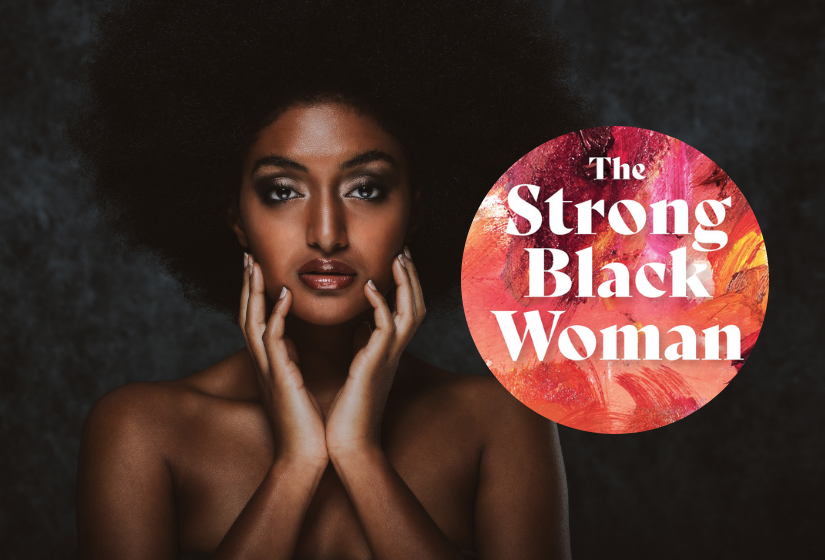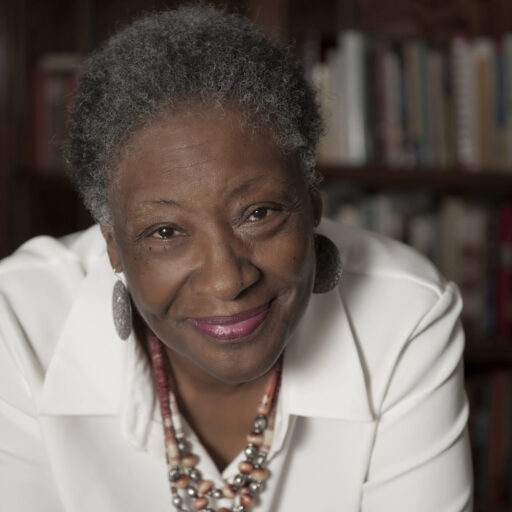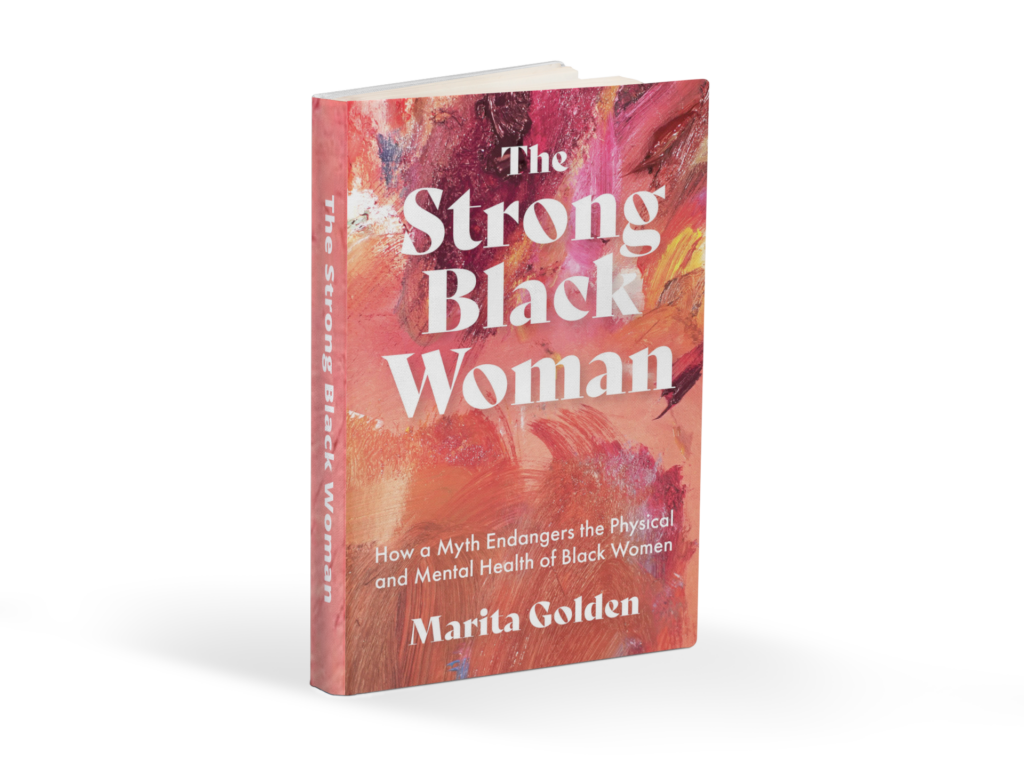
Writing my new book The Strong Black Woman How a Myth Endangers the Physical and Mental Health of Black Women, was as all my writing has been, another opportunity for growth and evolution. Black women today are the first generation allowing themselves to think about self-care and what it really means to be strong. The first generation to tally the price we have paid to always be Strong Black Women and decide it is too high.
It wasn’t going to be an easy conversation, but it was necessary.
“How do you feel about your stepdad dying, sad, right? I asked my husband’s ten-year-old niece.
“Uh-huh,” she nodded as we drove to an afternoon showing of the latest Disney summer
Blockbuster.
“How do you get over feeling sad? Did you cry?”
“I’m holding it in. I’m afraid to cry.”
There it was. A little Black girl, already a Strong Black Woman
The Strong Black Woman complex, deeply embedded in African American culture, is a response to systemic racism. It is a binding cultural code. In a society that marginalizes and erases us, Black girls like my husband’s niece and Simone Biles are raised to be resilient, to silence and even censor emotions and pain. The cost of that resilience is the relinquishing of fear, self-doubt, weakness. In families buffeted seemingly on all sides by the forces of inequality, the Strong Black Woman complex requires that we are self-sacrificing bulwarks of strength. Lean on Me is our anthem, a song that we voluntarily sing. It is an off-key tune that haunts and harms us. It is a song that is killing us.
Four out of five Black women are overweight or obese and Black women are dying of obesity-related illnesses (stroke, heart attack) more than any other group in the country. The fastest-growing segment of the population developing Alzheimer’s and other dementias are Black women. African American popular culture and Twitter hail “Black girl magic”, posit that Stacey Abrams should be president and that Amanda Gorman is a model for all young women everywhere. But the health emergency affecting millions of Black women needs attention too. Black women neglect their mental and physical health and millions of them are paying the ultimate price.
The long sordid history of enslavement and segregation, lack of access to good health care, food, and housing that persists in Black communities explains some of the statistics. But too many Black women simply believe that it is natural, it is right, it is noble to neglect their health and contentment and put others first. Cardiologist, Dr. Georgia Willie-Carnegie says, “I see it all the time. We’re so busy helping others we show up in the emergency room or doctor’s office at the last minute, often when treatment is least effective.”
Dr. Kanika Bell, an Atlanta-based psychologist said, “The Strong Black Woman began as a way to empower us. It said you can’t keep us down. Whatever you throw at us, we continue to rise. We never tire. We never complain. We never cry. But what was adaptive has become maladaptive. A mentally healthy Black woman cries, and she asks for help because she knows she is stronger in community.”
I have prided myself on my practice of self-care. My mother died of a massive stroke when I was 21 and my father suffered a fatal heart attack when I was 23. I vowed that I would be healthy. So, I adapted a semi-vegetarian diet, made exercise, from cardio to yoga a daily regimen, sought out mental health care when I needed it, and created a wide and nourishing circle of friends. That’s who I was when my husband was battling cancer but the impulse to bury my sense of grief, my confusion, in service to my husband and our family silenced me. As a Black woman, my first job was to “handle” whatever was thrown at me and I had to “handle” my husband’s illness. My angst could wait. I thought of myself as a New Age Strong Black Woman, but inside I was still the college junior who never thought to get counseling as my mother lay in a coma dying. I was the first to go to college and I had good grades to make. I was the middle-aged divorced single mother wearing a mask of competency and strength while I seemingly held my Black son’s fate in my unsteady, trembling hands. And I was the Black professional too strong and too self-managing of my anger to admit how the racism in my workplace had begun affecting my mental health. What I was suffering my was secret, my business, and I was a Strong Black Woman so nobody needed to know.
Like many Black women, I have been addicted to being and defining myself as strong because that self-definition is the one thing White folks can’t take from me whether it is true or not. For years I felt literally and physically strong, feeling the belief in the Strong Black Woman complex as an actual superpower. But it is a superpower that depends on habits of denial of anguish and pain.
Black women’s belief in our possession of a nearly supernatural resilience is a fiction that poisons our ability to extend to ourselves the generosity, the patience, and the love that we automatically extend to family and even friends who have been conditioned to depend on us for answers, for solutions and sometimes for salvation. I am heartened that in public and private dialogues we are creating conversations and programs in response to the negative health impact of Black women’s adherence to the Strong Black Woman complex.
Dr. Bell and other mental health professionals witnessed a dramatic increase both in first-time and returning Black female clients sparked by the national trauma both of the covid pandemic and the murder of George Floyd as well as reckonings with the continuing personal toll of systemic racism. Black women decided to set aside stigma, and uncertainty, and even guilt that sometimes prevented them from seeking mental health care and put themselves first.
We can use the traits of focus, courage, and persistence that iconic Black female heroes exemplified as tools in shaping a new, life-giving, and life-saving definition of what it means to be a Strong Black Woman. Harriet Tubman lived with depression and PTSD, Rosa Parks was ostracized by some in the Black community for the actions we now praise. Both women’s ability to live with and through those challenges is the chapter of their stories we need to hear and celebrate. Every mythology must periodically be redefined, or it loses relevance and even worse, becomes a danger. I’m going to keep talking to my husband’s niece until she understands there is no emotion and no feeling that she ever has to “hold in” to be strong.
To preorder The Strong Black Woman (Publication date October 12, 2021) visit Amazon or Mango.)

Marita Golden is the author of over 20 works of fiction and nonfiction. She is Co-founder and President Emerita of the Zora Neale Hurston/ Richard Wright Foundation. As a teacher of writing, she has served as a member of the faculties of the MFA Graduate Creative Writing Programs at George Mason University and Virginia Commonwealth University and served as a Distinguished Visiting Writer in the MA Creative Writing Program at John Hopkins University, and at the University of the District of Columbia. She has taught writing workshops nationally and internationally to a variety of constituencies and is a writing coach, workshop presenter, and literary consultant.




